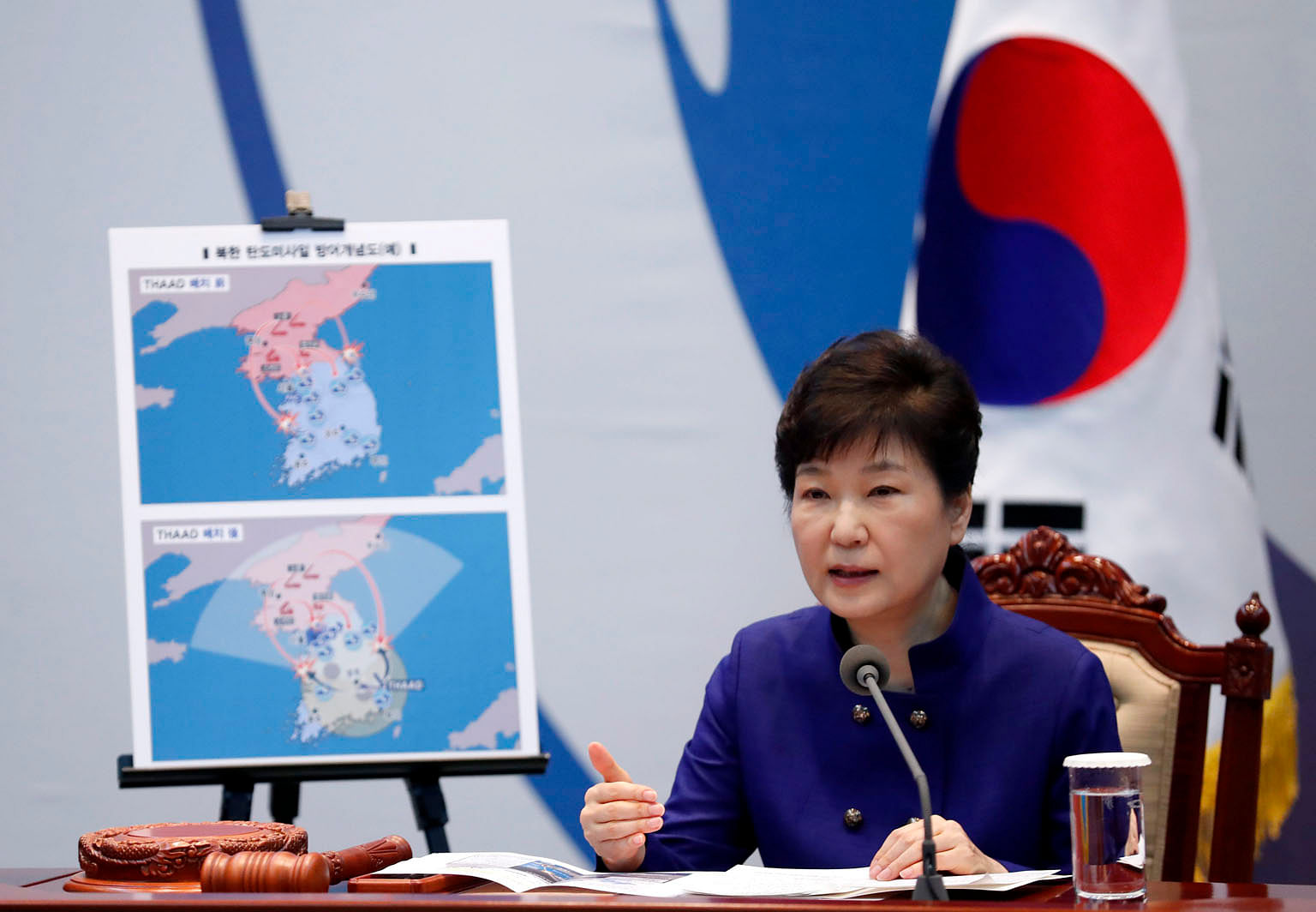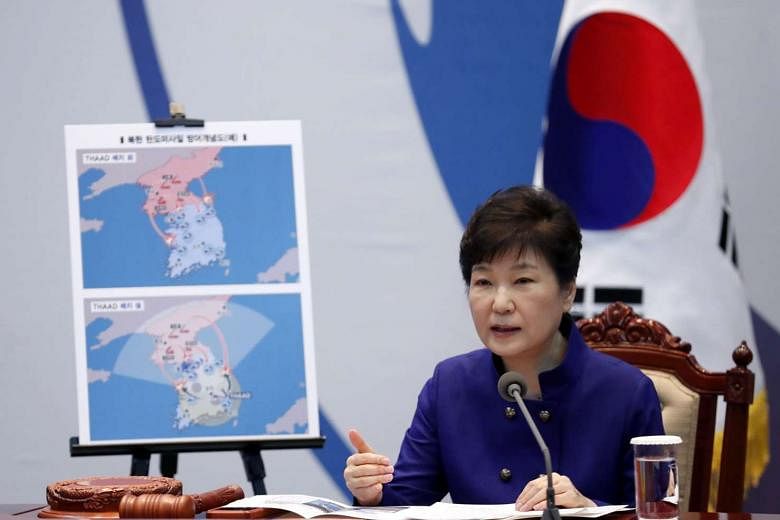Challenges for South Korea
Editorial
The Korea Herald
As expected, the decision to deploy a US missile defence system in South Korea has many ramifications that pose hard challenges to the country - specifically to President Park Geun Hye.
First of all, Ms Park needs to make sure the South Korean military prevents or deals properly with any provocations from North Korea, which is reacting fiercely to the planned deployment of the Terminal High Altitude Area Defence (THAAD) system.
In its first reaction to the announcement, the North's military threatened a direct strike.
A statement released by the North Korean army's artillery command said it would take "physical" actions against South Korea and the US "from the moment" the location for the THAAD system is fixed.

The statement, which came three days after the South Korea-US announcement, also seemed geared towards keeping the Pyongyang government in tune with China and Russia, which have also been vehemently protesting against the decision. It went on to say that South Korea and the US are building an "Asian version of Nato" and trying to "check big countries in North-east Asia".
It is obvious that North Korea is taking advantage of the THAAD issue to strengthen its solidarity with Russia and China. This may cause cracks in the current international sanctions against the North and embolden the North to engage in military provocations against the South.
Ms Park and her military generals must be prepared for this.
Another major challenge for Ms Park is minimising THAAD's negative impacts on South Korea-China relations.
China's strong protests have largely been anticipated, but reactions from the Beijing government do raise concerns.
It is not legitimate for China to blame only South Korea and the US for the current situation, which was caused by North Korea's pursuit of nuclear bombs and missiles. Being the North's former war ally and largest benefactor, China has done little to rein in the state, only calling for "calmness" whenever tension rises on the Korean Peninsula. Now is the time for Beijing to stay calm and not damage relations with Seoul.
It is hoped that the series of meetings later this month, including the Asia-Europe Meeting, Asean Regional Forum and the Group of 20 summit, will help Ms Park and Chinese leaders tackle the problem in a mutually beneficial way.
On the domestic front, Ms Park also faces the challenge of overcoming opposition to the deployment of the US missile defence system. Opposition parties and politicians are currently not united on the issue. There are also signs that liberals might use the issue to get ahead in the next presidential election. All this gives Ms Park no room for negligence.
Stronger alliance with US needed
Editorial
The Japan News
An agreement on the deployment in South Korea of an advanced US missile defence system is important as it will strengthen their bilateral alliance.
Deterrence against abrupt military action by North Korea must be steadily enhanced.
THAAD is designed to intercept North Korea's ballistic missiles in outer space or at high altitudes upon their re-entry into the atmosphere.
It is highly significant that the administration of President Park Geun Hye has opted for a path towards expanding its alliance with the United States, correcting its inclination towards Beijing over policy vis-a-vis North Korea.
South Korea took part in a Japan-US joint missile-tracking drill off Hawaii for the first time last month. It is essential to promote close defence cooperation among the three nations.
After pushing ahead with its fourth nuclear test in January, North Korea repeatedly test-fired ballistic missiles in defiance of sanction resolutions adopted by the UN Security Council.
North Korea has successfully launched a Musudan medium-range ballistic missile, a type of weapon said to be targeted at US military bases in Guam. Musudan and the medium-range ballistic missile Rodong, which has most of Japan within its range, are mobile types.
It cannot be overlooked that North Korea has increased its surprise attack capability by repeating the test-firing of missiles. It is feared that Pyongyang will resort to a new provocation in retaliation. Constant vigilance is called for.
It is a matter of concern that China strongly opposes the THAAD deployment decision, saying it "will seriously harm the regional strategic balance".
Washington and Seoul announced that THAAD will only target North Korea, but Beijing is wary, suspecting the radar will be used to monitor its military forces.
Behind this could be China's irritation over its failed attempt to alienate Seoul from Japan and the United States.
THAAD harmful instead of helpful
Wang Junsheng
China Daily
The Democratic People's Republic of Korea (DPRK) reportedly launched a submarine-based ballistic missile on Saturday. The launch came a day after Seoul and Washington jointly announced their decision to deploy the US-made THAAD system in the Republic of Korea (ROK) to "better tackle the DPRK's nuclear and missile threats".
On Friday, immediately after the US-ROK announcement, China and Russia expressed strong opposition to the move.
China's Foreign Ministry said in a statement that the deployment will "do nothing to help with denuclearisation of the Korean Peninsula, and (instead) will harm regional peace and stability".
The deployment of THAAD on ROK soil will pose a grave threat to China's core security interests.
To begin with, it is likely to further undermine the strategic trust between China and the US.
The Beijing-Seoul relationship, which is enjoying its best phase, will also fall victim to the US move.
The fruitful high-level exchanges between China and the ROK in recent years have a lot to do with the fact that Seoul has refrained from picking sides as China and the US struggle to resolve vital security issues.
The deployment of THAAD in the ROK is in essence part of the US' zero-sum game.
That the ROK finally accepted the US' proposal means it has decided to forgo its neutral stance and side with its ally to contain China.
The US-ROK move will also create more uncertainties for the region, especially because the DPRK's nuclear issue is yet to be resolved.
On the one hand, Beijing and Moscow have opposed the deployment of THAAD in the ROK, and will keep opposing it through different channels. On the other hand, since outside intervention has played a limited role in persuading Pyongyang to abandon its nuclear plans, the trilateral cooperation between Beijing, Washington and Seoul should not be ignored because it has proved to be the most effective means of curbing the DPRK's nuclear programme.
Hence, efforts by China, the US and the ROK may be undermined after THAAD's deployment.
- The View From Asia is a weekly compilation of articles from The Straits Times' media partner Asia News Network, a grouping of 21 newspapers.

